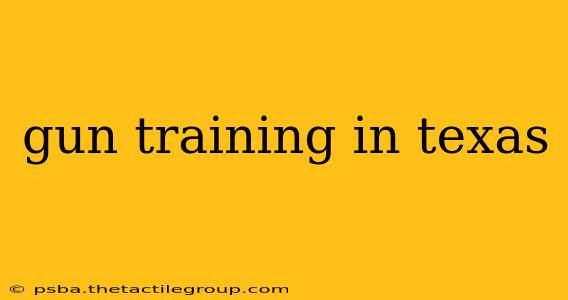Texas has a strong tradition of firearm ownership, and with that comes a responsibility to handle firearms safely and legally. This guide provides a comprehensive overview of gun training in Texas, covering licensing requirements, types of available courses, and crucial safety considerations. Whether you're a first-time gun owner or a seasoned shooter looking to enhance your skills, understanding the legal and practical aspects of gun training in Texas is essential.
Understanding Texas Licensing Requirements
Before diving into training options, it's crucial to understand Texas's licensing framework. Texas offers a License to Carry a Handgun (LTC), allowing eligible individuals to legally carry a handgun. Obtaining an LTC involves completing a state-approved training course, passing a background check, and meeting specific eligibility criteria.
Key Components of LTC Training:
- Classroom Instruction: This covers Texas handgun laws, safe gun handling practices, storage, and the legal implications of using a firearm in self-defense.
- Live-Fire Range Time: This practical component allows you to demonstrate safe and proficient handling of a handgun under supervision.
The specific requirements and curriculum can vary slightly between training providers, so it's crucial to confirm details with your chosen instructor.
Types of Gun Training Courses in Texas
Texas offers a diverse range of gun training courses catering to different skill levels and interests. These include:
1. Concealed Carry Courses (LTC):**
These courses are specifically designed to meet the requirements for obtaining a Texas License to Carry a Handgun. They cover the legal aspects of carrying a concealed handgun, self-defense laws, and safe handling practices.
2. Basic Pistol Courses:**
These courses provide foundational instruction in safe gun handling, marksmanship, and basic firearm maintenance. They are ideal for first-time gun owners or those seeking to refresh their skills.
3. Advanced Pistol Courses:**
For experienced shooters, advanced courses delve into more complex shooting techniques, such as tactical shooting, competitive shooting, and advanced self-defense strategies.
4. Specialized Courses:**
Texas also offers specialized courses catering to specific needs, including:
- Home Defense Courses: Focus on strategies and techniques for protecting your home.
- Women's Self-Defense Courses: Designed to empower women with the skills and confidence to defend themselves.
- Refresher Courses: Ideal for LTC holders who want to refresh their knowledge and skills.
Finding Reputable Gun Training Providers
Choosing a reputable training provider is paramount. Look for instructors with:
- Extensive experience and certifications: Check for qualifications and affiliations with recognized organizations.
- Positive reviews and testimonials: Read online reviews to gauge the quality of instruction and overall experience.
- Clear and detailed course outlines: Ensure the course covers all necessary topics and meets your needs.
- Safe and well-maintained training facilities: A safe environment is crucial for effective and safe training.
Beyond the Classroom: Continuous Learning and Safe Gun Handling
Obtaining your LTC or completing a basic gun course is just the beginning. Continual practice, ongoing education, and a commitment to safe gun handling are essential for responsible firearm ownership.
Key Safety Practices:
- Always treat every firearm as if it were loaded.
- Never point a firearm at anything you do not intend to shoot.
- Keep your finger off the trigger until ready to shoot.
- Be sure of your target and what is beyond it.
- Store firearms securely and out of reach of children.
Conclusion: Responsible Gun Ownership in Texas
Gun training in Texas is a crucial aspect of responsible firearm ownership. By understanding the licensing requirements, selecting appropriate courses, and prioritizing safe gun handling practices, Texas gun owners can contribute to a safer community while exercising their Second Amendment rights. Remember, responsible gun ownership is a lifelong commitment to safety, education, and legal compliance.

